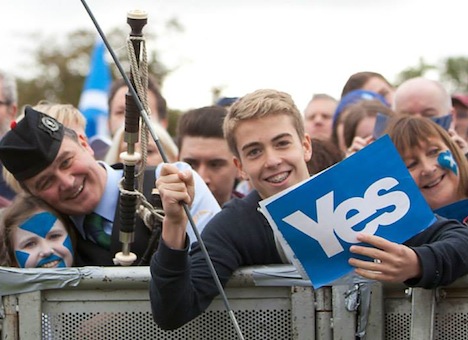 You know the unionist campaign against Scottish independence may be flagging when its strategists believe that its secret weapon is… former British prime minister Gordon Brown:
You know the unionist campaign against Scottish independence may be flagging when its strategists believe that its secret weapon is… former British prime minister Gordon Brown:![]()
![]()
Tavish Scott, the Lib Dem member of the Scottish parliament (MSP) for Shetland, says Mr Darling and Better Together have done well at providing an intellectual case for remaining in the UK, but have failed to connect with crucial sections of the electorate such as traditional Labour voters. Mr Scott wants major Labour figures in Scotland such as former prime minister Gordon Brown and former UK minister John Reid to take a greater role in shoring up “soft Labour” support for the union.
What’s clear is that the ‘Yes, Scotland’ campaign in favor of independence is gaining momentum, while the ‘Better Together’ campaign is losing steam.
A Panelbase poll conducted between April 27 and May 4 shows that the ‘No’ side would win 46% of the vote and the ‘Yes’ side would win 41% of the vote, with 14% undecided. Though Panelbase has typically shown a stronger ‘Yes’ vote than other polls, its findings are consistent with other surveys over the past month. While ‘No’ continues to lead ‘Yes,’ sometimes by double-digit margins, there’s no escaping that the polls are tightening.
That’s causing some alarm within both government and opposition circles. Though British prime minister David Cameron almost certainly believed that most Scottish voters wouldn’t support independence when he agreed to the terms of the referendum with Scottish first minister Alex Salmond last May, his governing Conservative Party must now face the prospect of a too-close-to-call referendum in Scotland just eight months before the wider UK general election in May 2015.
If Scotland votes ‘yes,’ or even comes close to endorsing independence, some senior Tories are already wondering if Cameron will have to resign — after 307 years of union with England, he’ll be the prime minister who ‘lost’ Scotland.
With the Scottish Labour Party largely leading the charge against independence, what will it say about the generation of national Labour leadership, including includes Scottish-born prime minister Tony Blair, that delivered devolution Scotland in 1997?
More fundamentally, however, why, so suddenly, does the ‘Yes’ campaign — once deemed hopeless — now seem like it has a chance? Continue reading Momentum shifts in favor of Scottish independence
